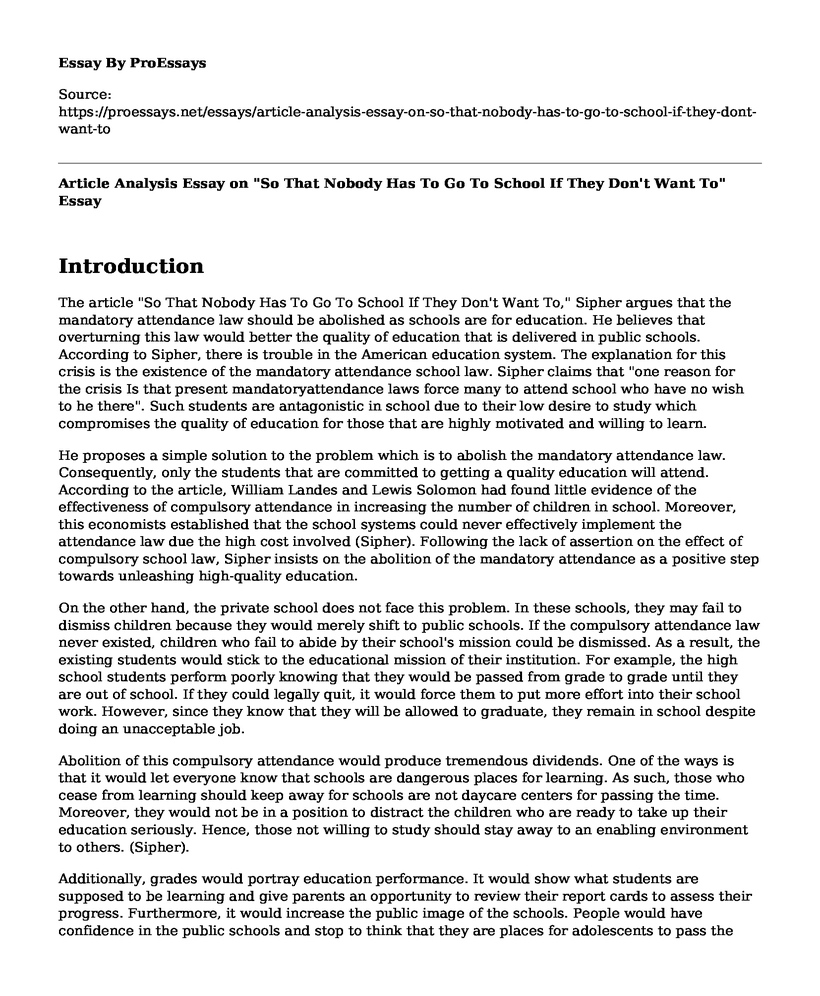Introduction
The article "So That Nobody Has To Go To School If They Don't Want To," Sipher argues that the mandatory attendance law should be abolished as schools are for education. He believes that overturning this law would better the quality of education that is delivered in public schools. According to Sipher, there is trouble in the American education system. The explanation for this crisis is the existence of the mandatory attendance school law. Sipher claims that "one reason for the crisis Is that present mandatoryattendance laws force many to attend school who have no wish to he there". Such students are antagonistic in school due to their low desire to study which compromises the quality of education for those that are highly motivated and willing to learn.
He proposes a simple solution to the problem which is to abolish the mandatory attendance law. Consequently, only the students that are committed to getting a quality education will attend. According to the article, William Landes and Lewis Solomon had found little evidence of the effectiveness of compulsory attendance in increasing the number of children in school. Moreover, this economists established that the school systems could never effectively implement the attendance law due the high cost involved (Sipher). Following the lack of assertion on the effect of compulsory school law, Sipher insists on the abolition of the mandatory attendance as a positive step towards unleashing high-quality education.
On the other hand, the private school does not face this problem. In these schools, they may fail to dismiss children because they would merely shift to public schools. If the compulsory attendance law never existed, children who fail to abide by their school's mission could be dismissed. As a result, the existing students would stick to the educational mission of their institution. For example, the high school students perform poorly knowing that they would be passed from grade to grade until they are out of school. If they could legally quit, it would force them to put more effort into their school work. However, since they know that they will be allowed to graduate, they remain in school despite doing an unacceptable job.
Abolition of this compulsory attendance would produce tremendous dividends. One of the ways is that it would let everyone know that schools are dangerous places for learning. As such, those who cease from learning should keep away for schools are not daycare centers for passing the time. Moreover, they would not be in a position to distract the children who are ready to take up their education seriously. Hence, those not willing to study should stay away to an enabling environment to others. (Sipher).
Additionally, grades would portray education performance. It would show what students are supposed to be learning and give parents an opportunity to review their report cards to assess their progress. Furthermore, it would increase the public image of the schools. People would have confidence in the public schools and stop to think that they are places for adolescents to pass the time.
To add on to that, there would be the elimination of the cost that is used in enforcing the compulsory education. The saved amount would be used in the community to support people, not in school. Lastly, there would be changes in elementary schools to help children learn early enough. Also, it would assist the teachers in correcting their mistakes to avoid transferring them to the junior school.
Works Cited
Sipher, Roger. "So That Nobody Has to Go to School if They Don't Want." Breaking News, World News & Multimedia - The New York Times, 19 Dec. 1977, www.nytimes.com/1977/12/19/archives/so-that-nobody-has-to-go-to-school-if-they-dont-want-to.html.
Cite this page
Article Analysis Essay on "So That Nobody Has To Go To School If They Don't Want To". (2022, Nov 21). Retrieved from https://proessays.net/essays/article-analysis-essay-on-so-that-nobody-has-to-go-to-school-if-they-dont-want-to
If you are the original author of this essay and no longer wish to have it published on the ProEssays website, please click below to request its removal:
- The Effect of Mobile Learning on the Development of the Students Learning Behaviors and Performance
- Self-Reflection Report: Academic Interest in Journalism
- The Negative Technological Effects on Education and Children Essay
- Bussing Program Beneficial to Unrepresented Minorities: Rose Place Case Study
- Essay Example on Who Owns a Child? Exploring the Debate on Paternity Fraud Laws
- Parents of ASC Pupils: Supported by School Staff in EHCP Reviews - Essay Sample
- School Uniforms: Striking a Balance in Debate - Essay Sample







